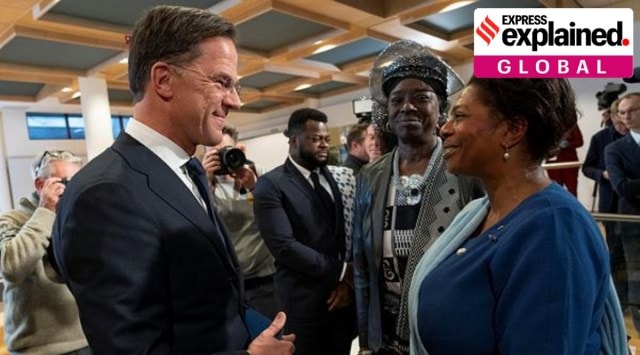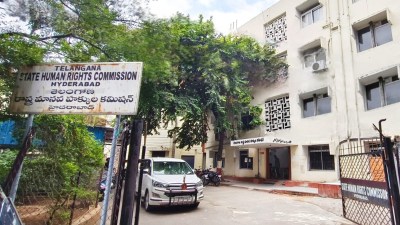While Rutte’s apology is historic, members of the aggrieved communities say it smacks of “colonialist attitudes’ ‘, as it was delivered without due consultation with them. Also, many have claimed, an apology without reparations is not enough.

The increased engagement of the Dutch with their racist and colonial past has been spurred on by the murder of George Floyd in the US in 2020. Rutte’s apology follows the report of a national advisory panel which was set up after Floyd’s murder.
What exactly did Rutte say?
In a speech made at the National Archives in The Hague, Rutte said, “We who live in today’s world must acknowledge the evils of slavery in the clearest possible terms, and condemn it as a crime against humanity. As a criminal system which caused untold numbers of people untold suffering. Suffering that continues in the lives of people today. And we in the Netherlands must confront our part in that history.”
Saying that the slaves were “wrenched from their families and stripped of their humanity”, and “treated like cattle”, Rutte said while no one alive today was to blame for the past Dutch atrocities, “it is also true that the Dutch State, in all its manifestations through history, bears responsibility for the terrible suffering inflicted on enslaved people and their descendants.”
What was the Dutch role in the slave trade?
According to the United Nations Slavery and Remembrance website, “Like other European maritime nations, the Dutch were quick to involve themselves in the transtlantic slave trade. Between 1596 and 1829, the Dutch transported about half a million Africans across the Atlantic. Large numbers were taken to the small islands of Curaçao and St. Eustatius, in the Caribbean… The Dutch also shipped about a half million Africans to their settlements in Dutch Guiana, notably Suriname, where they worked primarily on sugar plantations.”
Story continues below this ad
The Dutch put slaves to work in their coffee, sugar and tobacco plantations, apart from household labour in colonies. The centuries of slave trade funded what is known as Netherlands’ ‘golden age’ – the period roughly between 1585-1670, when trade, arts, sciences and the military flourished in the country.
According to Rutte’s speech, “By 1814, more than 600,000 enslaved African women, men and children had been shipped to the American continent, in deplorable conditions, by Dutch slave traders… In Asia, between 660,000 and over one million people – we don’t even know exactly how many – were traded within the areas under the authority of the Dutch East India Company.”
When slavery was formally abolished in 1863, it was not the slaves who received compensation from the Dutch state, but the slave owners.
What else is the government doing?
While Rutte made his apology in The Hague, representatives of his government are travelling to former colonies to make similar apologies – to Suriname, Aruba, Curaçao, St Maarten, Bonaire, St Eustatius and Saba.
Story continues below this ad
Apart from this, according to an official statement, “The government will make €200 million available in a fund for measures aimed at raising awareness, fostering engagement and addressing the present-day effects of slavery.”
An independent commemoration committee has been proposed, which will “be tasked with ensuring a large-scale, dignified commemoration of the history of slavery on 1 July 2023, together with the Caribbean parts of the Kingdom, Suriname and other countries.”
July 2023 is being seen as the 150th aniversary of the abolition of slavery, as, while it was formally abolished in 1863, another 10 years were required to put it into practice.
A criticism frequently levelled at The Netherlands is that its school education system does not adequately engage with its colonial and slave trading past. The government in its recent statement said it will “give the Netherlands’ role in the history of slavery a substantial place in education, as this is where young people come into contact with history.”
Story continues below this ad
Apart from this, the country is also looking at returning artworks looted during the colonial period.
Why are some unhappy with the apology?
Some activist groups had wanted the apology to come from King Willem-Alexander, in the former colony of Suriname on July 1, 2023, and the process to have been more consultative. Yet others have criticised the fact that the apology has not been accompanied with reparations.
“What was completely missing from this speech is responsibility and accountability,” Armand Zunder, chairman of Suriname’s National Reparations Commission, was quoted as saying by Reuters. “If you recognise that crimes against humanity were committed then the next step is you say I’m responsible for it, we’re liable for it …. Indeed I’m talking about reparations.”
The Guardian reported that the Sint Maarten Prime Minister, Silveria Jacobs, said the island would not accept any government apology “until our advisory committee has discussed it and we as a country discussed it”.
Allegations of racism today
Story continues below this ad
In 2020, the then UN rapporteur on racism, Tendayi Achiume, had said that a self-image of “tolerance” was blocking the tackling of discrimination in The Netherlands.
The country has seen allegations of systematic racism in its police force and other government services, dual nationals have been unfairly accused of childcare benefits fraud, and migrants have in general been found to have lower levels of educational and professional success than White Dutch people.
As Rutte said in his speech, “Centuries of oppression and exploitation still have an effect to this very day. In racist stereotypes. In discriminatory patterns of exclusion. In social inequality.”
The apology itself has been a long time coming. Sections of the Dutch population feel the nation today has nothing to apologise for in crimes committed centuries ago, while some fear that an apology can open the floodgates to demands for reparations.








































